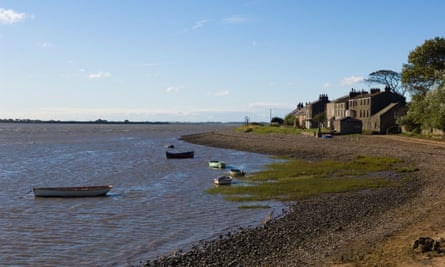
Solitude and sky, Northumberland
For low-tide loveliness, the coastline between Alnmouth and Cresswell in Northumberland takes some beating. With the tide out the beaches and skies are overwhelming, especially on a sunny day. The coast is vast, so if you like solitude you’ll find it here. You have the bonus of a wander into the beautiful village of Warkworth and the small town of Amble. Access to public transport in this area is pretty good too, considering its remoteness.
Barry Peaden
Wind and waves, Lancashire
The 13-mile long Fylde coastal plain between Rivers Lune and Wyre has subtle charms – wide horizons, incandescent sunsets, mudflats, marshes, racing tides, redshanks, curlews and lapwings. The handful of lonely Georgian houses at Sunderland Point, nakedly exposed to wind and waves, are cut off twice daily as the causeway is submerged at high tide, so plan your visit with care. Heading south, Glasson Dock grew through the cotton trade to be the main port in the north-west – a history that is hard to reconcile with its languorous present. You can cycle to Lancaster in half an hour on the old branch line, visit the smokehouse where there’s “nothing added except smoke, salt and time”, and watch the boats on the Lancaster canal.
Martin Charlesworth
Profile
Readers’ tips: send a tip for a chance to win a £200 voucher for a Coolstays break
Show
Guardian Travel readers’ tips
Every week we ask our readers for recommendations from their travels. A selection of tips will be featured online and may appear in print. To enter the latest competition visit the readers’ tips homepage
–
Lovely Llŷn peninsula, Gwynedd
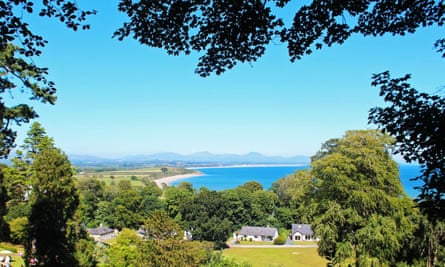
Llanbedrog beach on the Llŷn peninsula in north Wales is a lovely beach owned and run by the National Trust. It is picture-postcard perfect, with a row of colourful beach huts along the edge for hire. To get there you need to follow the road down towards the sea from the village. On the right you will pass some handy public toilets, then further along, just before you get to the beach, is a popular cafe that serves breakfast and lunch. The beach is sandy, protected and shallow, so ideal for families. It’s also quieter than other beaches nearby. If you get good weather I couldn’t think of a better place to spend the day than on this beach.
Julie Casey
Hold the fort, Arran
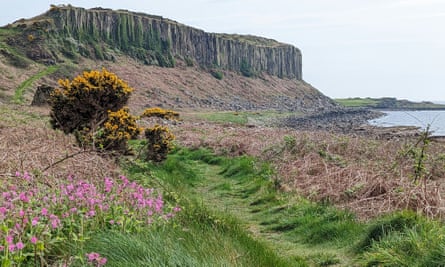
Easy to get to yet delightfully wild, the Isle of Arran offers an accessible way to reconnect with the natural world. Walk the spectacular stretch from the King’s Cave car park, near Machrie, to Blackwaterfoot and spot sea otters hunting for crabs, seals basking on the rocks and gannets nose-diving into the clear blue waters. Then there’s spooky King’s Cave with its legends and ancient carvings, and dinosaur “pawprints” fossilised into the rock. But the showpiece is the prehistoric Doon Fort. Jump from boulder to boulder as you round the headland beneath towering vertical cliffs before crossing the sands to Blackwaterfoot, with its quaint honesty-box bakery full of flaky pastries.
Lisa Morgan
Traditional family fun, Essex
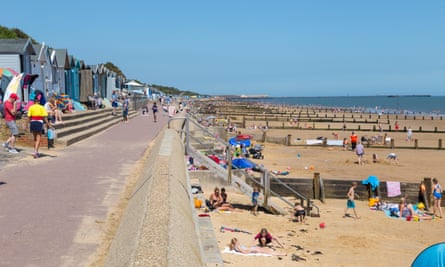
A walk north from Frinton-on-Sea is a few miles of perfect family Essex beachland. On your left, you’ll pass double rows of candy-coloured, cheerfully named beach huts; on your right you have huge flat stretches of ochre sand, broken only by the regular black lines of groynes. Shallow and sloping, it’s perfect for letting dogs and children run wild, collecting sea glass and shells. Crossing round The Naze – which means headland in Old English, but as a child I was convinced it referred to its nose-like shape – will bring you to Walton-on-the-Naze. Round off the day there on the pier, with an ice-cream and some traditional penny arcades.
Sophie
Dunes and Downs, West Sussex
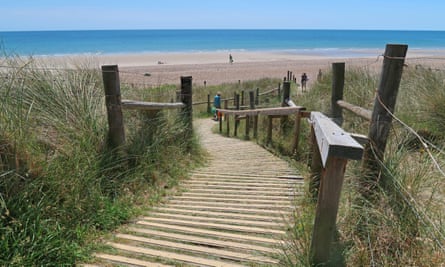
West Beach, Littlehampton nestles in the Climping Gap, the only undeveloped coastline between Bognor Regis and Brighton. It’s a walk along the river from Littlehampton station and is a protected nature reserve backed by sand dunes, fields and views of the South Downs. All of the benefits of the sunny south coast climate without the crowds. The further west you go, the quieter it is. Undeveloped also means no shops, so bring your own provisions, but there is the excellent West Beach Cafe at the entrance to the beach. Top it off with fresh dressed crab and a pint at the Arun View pub on the quayside before catching a train home.
Leigh
after newsletter promotion
Great escape, Cumbria
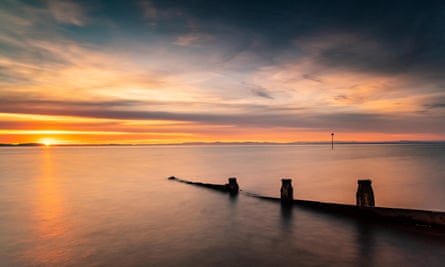
For me, the best areas of coast have that effect of drawing you out of yourself as you look out to sea. There’s no better place to do that than from Silloth in Cumbria, with its expansive, endless sea views. Locals will proudly tell you that Turner painted here, but my interest is even more romantic. During the second world war my (southern) grandfather was based here and met my grandmother, marrying months later. Made up of wide, flat, open spaces, it’s a town you can imagine teenagers wanting to escape from, but the captivating coastline will keep drawing visitors back.
Sarah
Sea life in Shetland
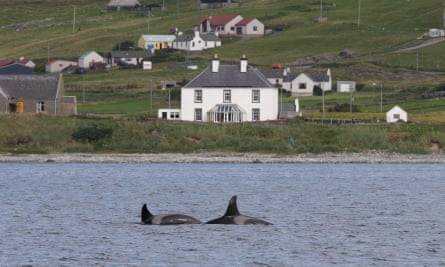
Take the short ferry trip in season from Sandwick in Shetland to the island of Mousa for a bracing walk around the island. The highlight is a well-preserved iron age “tower block”. In actual fact, Mousa broch is a 2,000-year-old round house which, for a short period each summer, accommodates nesting storm petrels. Other birds are easy to observe too – the island is an RSPB reserve. If you are lucky you can also see harbour porpoises on the boat over and seals on the beach.
Emma
England’s best, Cornwall
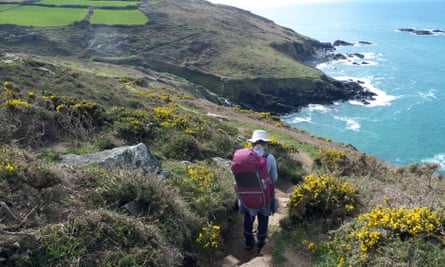
The coast path from St Ives to Zennor is the best path in England. It’s physically challenging and gloriously varied as you skirt coves, descend to the coast then rise to the cliffs, watching seals and seabirds among wildflowers, rills and granite boulders. The Tinners Arms pub in Zennor is a satisfying end point for a pint of cider and the topless bus back to St Ives.
Stephanie
Winning tip: Eerie Anglesey
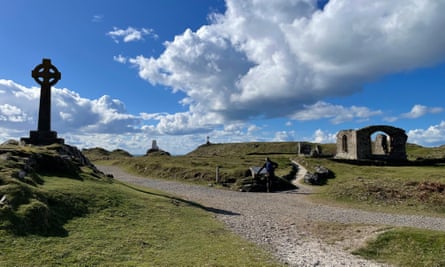
Anglesey (or Ynys Môn) has some amazing coastline, with the bonus of feeling remarkably undiscovered, so you often get the walks to yourself. In the south-west corner lies Newborough Forest. This is classic pine forest stretching down through dunes to wide sandy beaches, full of birdlife – and if you’re lucky you’ll see red squirrels, too. Full of paths and tracks, best of all is when the tide is out – you can walk to Ynys Llanddwyn, with its ruined ancient church, standing crosses and old lighthouse. Take a picnic and soak up the atmosphere of this eerie, beautiful spot.
Jane Bainbridge

Use the comments to tell us about a stretch of UK coastline you particularly enjoy



